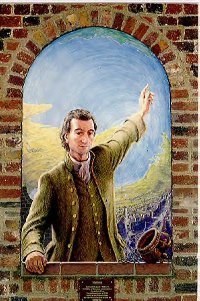See Dissecting Deism Past and Present
What is Natural Theology?
Natural theology is a branch of theology based on reason and ordinary experience, explaining the gods rationally, as part of the physical world. Thus it is distinguished from revealed theology (or revealed religion) which is based on scripture and religious experiences of various kinds...The theologians of natural theology are the philosophers, asking for the nature of the gods, and the theologians of mythical theology are the poets, crafting mythology. The terminology entered Stoic tradition and is used by Augustine of Hippo.
Natural theology, thus, is that part of the philosophy of religion dealing with describing the nature of the gods, or, in monotheism, arguing for or against attributes or non-attributes of God, and especially the existence of God, purely philosophically, that is, without recourse to any special or supposedly supernatural revelation. (Wiki)
"Natural Theology" is the favorite term in the eighteenth and nineteenth centuries designating the knowledge of God drawn from nature in distinction from the knowledge of God contained in revelation.
This division of theology into natural and revealed had its roots in the scholastic distinction between the two truths, one derived from nature by the use of the Aristotelian logic, subject to the authority of the Church, the other, truth above reason, revealed by God but formulated and taught solely by authority of the Church.
The deists relied exclusively on natural theology, on the ground that the being and attributes of God could be exhaustively ascertained from the constitution and course of the world, thus superseding the necessity of supernatural revelation. David Hume, by his theory of knowledge, proved that even this knowledge was too precarious for rational certitude.
On the other hand, Bishop Butler (Analogy of Religion, London, 1736) maintained that natural and revealed religion were so far one that the truths of natural theology provided a basis for the characteristic truths of the Christian faith, such as miracles, the incarnation, and redemption.
Later, the wisdom, power, and even the goodness of God were held to be demonstrable by the processes of natural theology (Samuel Clarke, A Demonstration of the Being and Attributes of God, London, 1-105; William Paley, Natural Theology, ib. 1802).
The function and name of natural theology continued in vogue until the latter portion of the 19th century. This habit of thought has, however, been strongly opposed by Ritschl and his school. Relying on Kant's distinction between the pure and the practical reason, they seek the source of the knowledge of God not through the theoretic judgments of science or philosophy, but only through value-judgments to which revelation is addressed. Nature being impersonal can neither receive nor communicate the personal redemptive disclosure of God which man needs for reconciliation with him; this is to be sought ultimately only in Christ and the Christian community.
Ref. The Internet Encyclopedia of Philosophy
- Islam Versus Deism
- Left vs Right, Montesquieu, Corporatism
- Eastern Roman Empire and Islam
- Philosophies of Islam, Greece, and the West by Turgut Ozal
- Example of Islam and science.
- Maimonides Versus Aristotle and the Jews of Spain, Thirteen Rules
- Handbook on the History of Modern Science
- Pelagius and why he was right
- Islam Versus Judaism and Christianity
- Islam to Deism: Why I became a Deist
Web site Copyright Lewis Loflin, All rights reserved.
If using this material on another site, please provide a link back to my site.

